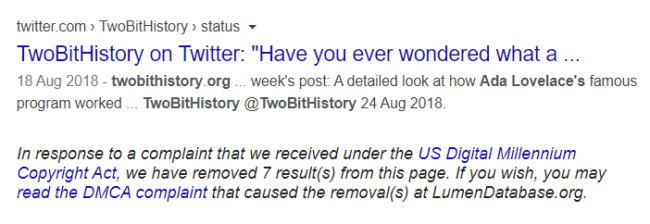 Every hour of every day of every week of every year, anti-piracy companies send out DMCA notices to remove supposedly infringing content from the Internet.
Every hour of every day of every week of every year, anti-piracy companies send out DMCA notices to remove supposedly infringing content from the Internet.
Many of these are legitimate takedown requests, targeting everything from movies and TV shows, to music, games, software and anything else that can be digitally reproduced. For copyright holders it’s a herculean task and as a result, mistakes can happen. The scale is such that it’s almost inevitable.
Unfortunately, however, some ‘mistakes’ are so ridiculous as to be unforgivable, especially when they target completely innocent individuals hoping to make a difference with the positive spread of knowledge and information. Case in point: Sinclair Target, the owner of computing history blog, Two-Bit History.
In 2018, Target wrote an article about Ada Lovelace, the daughter of Lord Byron who some credit as being the world’s first computer programmer, despite being born in 1815. Unfortunately, however, those who search for that article today using Google won’t find it.
As the image below shows, the original Tweet announcing the article is still present in Google’s indexes but the article itself has been removed, thanks to a copyright infringement complaint that also claimed several other victims.

While there could be dozens of reasons the article infringed someone’s copyrights, the facts are so absurd as to be almost unbelievable. Sinclair’s article was deleted because an anti-piracy company working on behalf of a TV company decided that since its title (What Did Ada Lovelace’s Program Actually Do?) contained the word ‘DID’, it must be illegal.
This monumental screw-up was announced on Twitter by Sinclair himself, who complained that “Computers are stupid folks. Too bad Google has decided they are in charge.”
At risk of running counter to Sinclair’s claim, in this case – as Lovelace herself would’ve hopefully agreed – it is people who are stupid, not computers. The proof for that can be found in the DMCA complaint sent to Google by RightsHero, an anti-piracy company working on behalf of Zee TV, an Indian pay-TV channel that airs Dance India Dance.
Now in its seventh season, Dance India Dance is a dance competition reality show that is often referred to as DID. And now, of course, you can see where this is going. Because Target and at least 11 other sites dared to use the word in its original context, RightsHero flagged the pages as infringing and asked Google to deindex them.
But things only get worse from here.
Look up the word ‘did’ in any dictionary and you will never find the definition listed as an acronym for Dance India Dance. Instead, you’ll find the explanation as “past of do” or something broadly along those lines. However, if the complaint sent to Google had achieved its intended effect, finding out that would’ve been more difficult too.
Lo, here it is in its full glory.

As we can see, the notice not only claims Target’s article is infringing the copyrights of Dance India Dance (sorry, DID), but also no less than four online dictionaries explaining what the word ‘did’ actually means. (Spoiler: None say ‘Dance India Dance’).
Perhaps worse still, some of the other allegedly-infringing articles were published by some pretty serious information resources including:
-USGS Earthquake Hazards Program of the U.S. Geological Survey (Did You Feel It? (DYFI) collects information from people who felt an earthquake and creates maps that show what people experienced and the extent of damage)
– The US Department of Education (Did (or will) you file a Schedule 1 with your 2018 tax return?)
– Nature.com (Did pangolins spread the China coronavirus to people?)
Considering the scale of the problem here, we tried to contact RightsHero for comment. However, the only anti-piracy company bearing that name has a next-to-useless website that provides no information on where the company is, who owns it, who runs it, or how those people can be contacted.
In the absence of any action by RightsHero, Sinclair Target was left with a single option – issue a counterclaim to Google in the hope of having his page restored.
“I’ve submitted a counter-claim, which seemed to be the only thing I could do,” Target told TorrentFreak.
“Got a cheery confirmation email from Google saying, ‘Thanks for contacting us!’ and that it might be a while until the issue is resolved. I assume that’s because this is the point where finally a decision has to be made by a human being. It is annoying indeed.”
Finally, it’s interesting to take a line from Target’s analysis of Lovelace’s program. “She thought carefully about how operations could be organized into groups that could be repeated, thereby inventing the loop,” he writes.
10 DELETE “DID”
20 PROFIT?
30 GOTO 10






